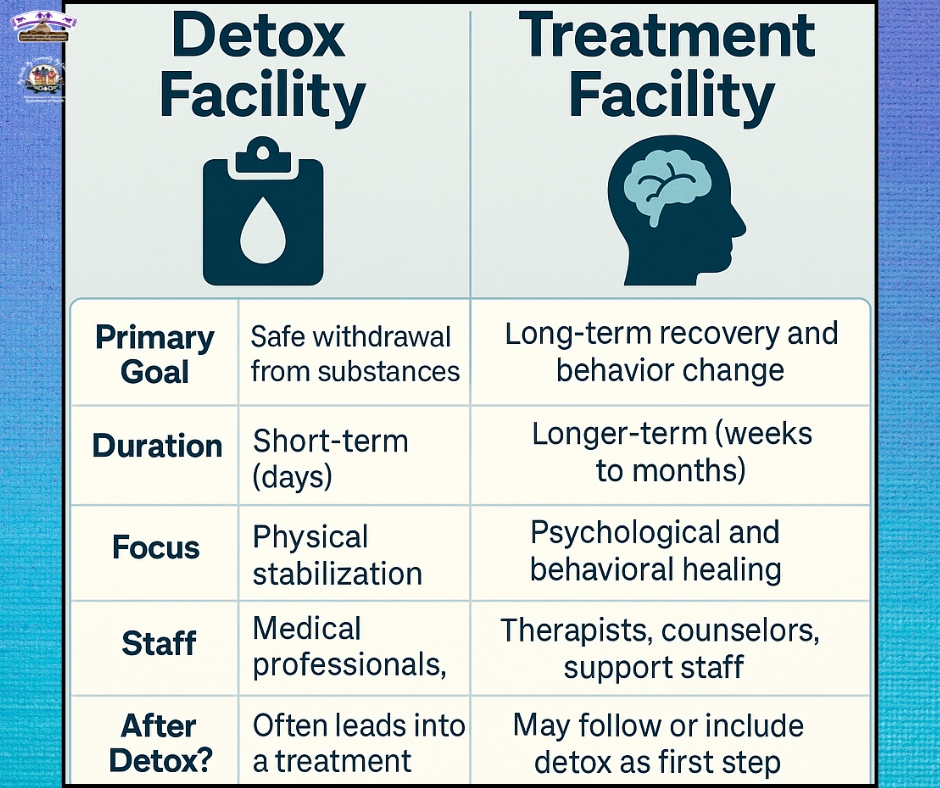DETOX CENTERS AND TREATMENT FACILITIES: THE DIFFERENCES
In response to the rising need of a detox center within our own community, the Mohawk Council of Akwesasne’s Department of Health opened the Sahatihará:ne Detox Center (SDC). With the doors to the detox center being open for many months, there have been many misconceptions on what a detox center does, and what it does not, for a person’s recovery journey.
 WHAT IS DETOX?
WHAT IS DETOX?
Detoxification, or “detox,” is the process in which the body clears itself of toxins, drugs, and other harmful chemicals ingested through drug use. The body, over time and frequent use, has become reliant on the drugs or chemicals ingested, and becomes addicted. Detox is considered to be the “first step in treatment and recovery.”
When done “cold turkey,” or completely stopping on your own, can be dangerous to that person’s health. A medical intervention, or detox through a medically supervised center, is often recommended. The medical team at a detox center can help manage and safely handle withdrawal symptoms that come with detoxification.
Detox is a critical and vital role in a persons recovery. It gives them a “clean slate,” providing them with a physically stable body to begin their recovery journey. The mental and emotional recovery process is handled in a rehab/treatment center.
As noted by the National Institute on Drug Abuse, “Detoxification alone does not address the psychological, social, and behavioral problems associated with addiction and therefore does not typically produce lasting behavioral changes necessary for recovery. Detoxification should thus be followed by a formal assessment and referral to drug addiction treatment.”
 WHAT IS REHAB/TREATMENT?
WHAT IS REHAB/TREATMENT?
“Rehab” is short for rehabilitation and is the process for restoring a person’s health (physical, mental, emotional) through treatment or therapy. Drug rehab refers to the treatment needed to overcome drug abuse and establish healthy living habits. Rehab can also include the therapy needs to heal from the mental and physical detriments that can occur alongside addiction. “Drug treatment” and “recovery center” is synonymous with drug rehabilitation.
There are many types of rehab facilities, such as long-term residential (30, 60, and 90-day) and outpatient. 90 days is typically the recommended length of stay for many rehab centers.
Rehab centers typically offer the following:
• Long-term and extended care programs for clients
• Residences for the clients to live
• A variety of evidence-based therapy treatments, tailored to client needs
• Multiple interventions and episodes for treatment
• Ongoing care services and supports for clients
• Regular monitoring of clients, through residences or sober living homes
Once a client of the Sahatihahará:ne Detox Center has completed their process, they are provided with resources and referrals to long-term treatment centers and services. SDC staff will work with that client to plan their recovery, to the best of their ability. Ultimately, the choice to continue the recovery path is up to the client.
 DETOX CENTER HOURS & SERVICES
DETOX CENTER HOURS & SERVICES
Currently, the Sahatihahará:ne Detox Center is open Monday to Friday, 8:00 a.m – 5:00 p.m. The detox center offers weekly pre-admission screenings with its attending physician, Dr. Scott. The detox center has medical personnel as well as support staff to assist with all phases of the clients stay. Staff provide medical management to case management, offering referral services to treatment services upon completion of their detox process.
One of the long-term goals of the detox center is to expand services and hours. DOH administration and staff are researching and pursuing various avenues to see this goal be completed.
 CONTACT SDC
CONTACT SDC
For more information, please call the Sahatihahará:ne Detox Center at 613-932-5050.

